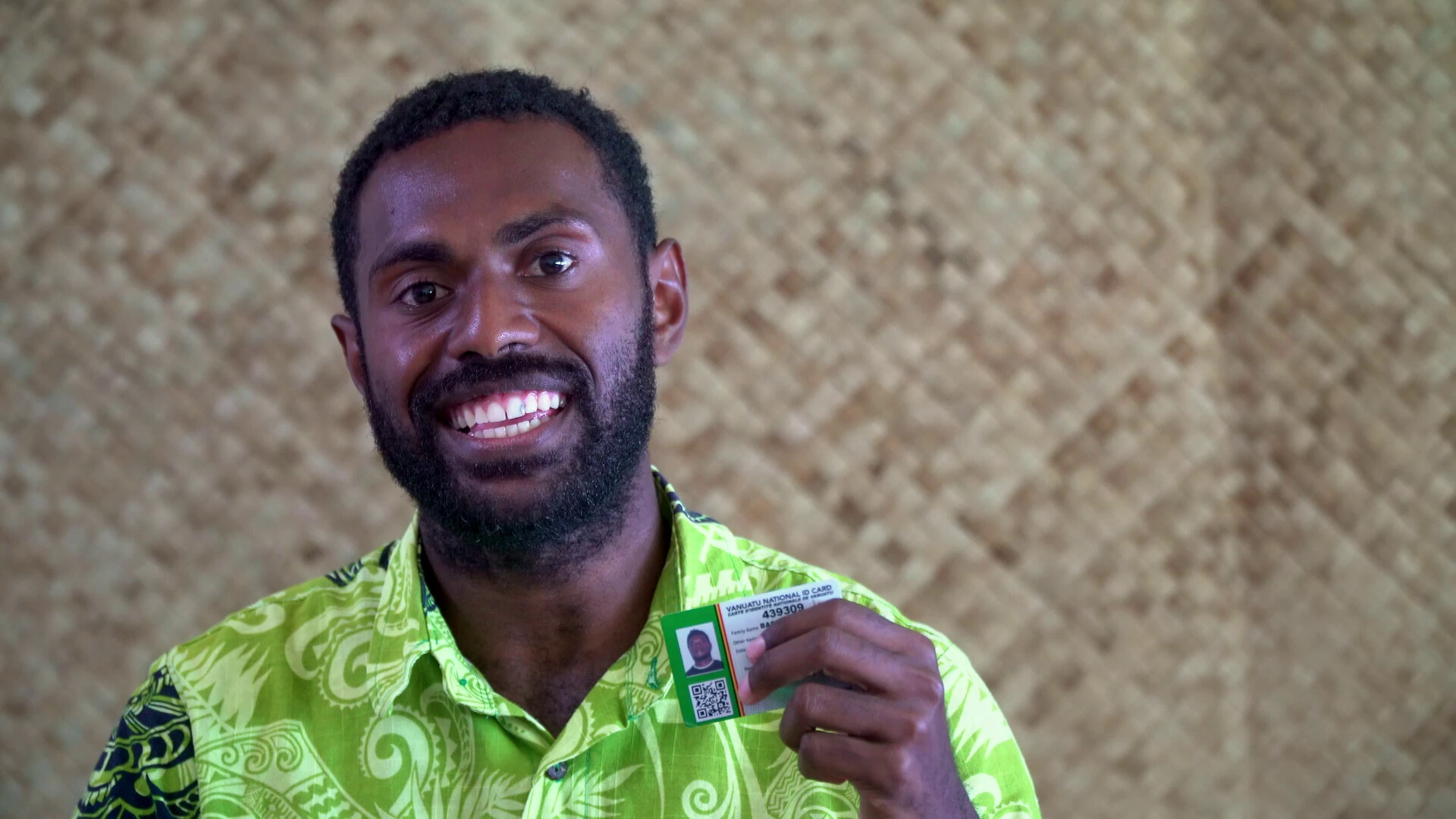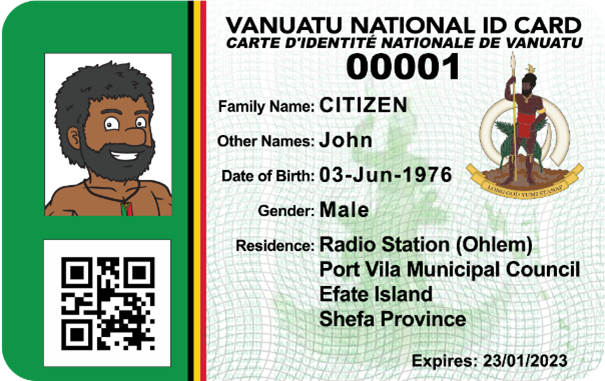The national ID card is a small object, but with huge impact on governance, transparency, and reporting for Vanuatu.
Digital National ID - A small item in the pocket but a big step for Vanuatu
September 6, 2022

With the close cooperation of Vanuatu’s Electoral Authorities, the Civil Registry and Identity Management Department (CRIMD) and the Vanuatu Electoral Environment Project (VEEP), funded by the New Zealand Government and managed by the United Nations Development Program (UNDP), significant electoral reforms are underway aimed at fairer, transparent elections in turn leading to good governance and economic development outcomes.
One of the most challenging issues faced by the Electoral Commission and its operational arm, the Vanuatu Electoral Office (VEO), in targeting fair elections was how to “clean” a flawed voter register. The government decided to link the voter register with the civil register and establish a central civil register as the population source data and issue national ID cards to the citizens. In so doing, other envisaged uses were soon being realised.
The CRIMD is in the process of adding biometric data such as an ICAO compliant photograph and fingerprints, which together with a Unique and Universal Identification Number, will ensure every person on the voter register has one, and exactly one identity. Over 72 percent of ID Card owners (165,396) are already actively using the ID Card as voter identification with the old Voter Card being phased out by year’s end. This will eliminate much of electoral fraud related to voter lists. But it will also allow CRIMD to expand to many more innovative uses.
The rapid uptake by Ni-Vanuatu of this national identity card is now at more than 230,000 citizens or about 77 percent of the population (300,019 by 2020 National Census). Why? Because it’s efficacious in every way!
The substantially improved geographical data used for individual addresses also streamlines allocating a Ni-Vanuatu citizen to a polling station voter list. But it’s also great for planning and targeting health policies to communities in need, better allocation of public benefits, education and urban planning.
For example, Vanuatu is ranked highest on the Global Index for natural disasters – cyclones, earthquakes, volcanic eruptions, landslides, flooding, and tsunamis. The National Disaster Management Office (NDMO) is now using the ID Card for disaster planning, preparation, and response with conduct of Disaster Needs Surveys and allocation of relief packages via the village locator and an individual’s exact location. Previously one village may have received several relief-supply packages due to the duplications, multiple naming or have had several agencies to do the disaster assessments – over and over – leading to disaffection and lack of engagement in critically important response analysis. The result of better data management will be the reduction of these planning inefficiencies. It is also a tool for tracking displaced persons after natural disasters, preparing of medical supplies and assisting with planned response from the Ministry of Health, Ministry of Education, iNGOs, NGOs and Development Partners.

The Ministry of Health used the ID Card in connection with the National COVID-19 Vaccination Program and now intends to use the ID Card for future vaccination programs such as measles and for planning new clinic locations, pharmaceutical needs for specific areas and nurse education and allocation to high population growth areas. WHO plans to use it as basis for health research and policy development. CRIMD Provincial Assistant Registrars based in each of the six Provincial Hospitals capture data at the “book-ends” of life – birth & death - as well as active whole of life usage. As people access health services using the ID Cards, the previously deeply flawed Birth and Death records are systematically and progressively updated ensuring Patient Record verification is becoming more and more accurate - as is the National Voter Register.
Similarly, the Ministry of Education (MoE) is also intending to use the ID Card issued at birth at hospitals/health centres and later village registration to provide MoE planners with evidence based, age specific data for future new school construction needs that are geographically established or for amalgamation due to declining cohorts/intakes. Planning and budget allocations can be forecast for new teacher numbers as well as needs for increase/decrease at Vanuatu Institute of Teacher Education, school supply needs, textbook orders, School Zone planning projections, movement of students due to disaster response (increased/decreased need) and student data and education outcome records.
A network of young people living in the provinces and speaking the local language were trained as Data Collection Officers (DCOs). Being embedded into their respective communities, they know who lives where or which Chief or Church Elder to approach to find out if someone has died or moved to another village or island – and therefore another constituency. Armed with 400 solar powered tablets programmed with a VEEP designed App enabling offline registration, the officers moved around their locality registering citizens and establishing their legal identity. No matter how remote the village, the data is automatically synchronised when the DCOs are back online. A great way to bring the government closer to its people!
The vision is to eventually connect all SIM cards in Vanuatu to their holder’s ID, and to release a public service portal to maintain this information up to date and accurate. This, in turn, will enable the use of identification for all sorts of economic activities and will improve financial inclusion in the country. People will be able to access many government services online, saving precious time and money.
This portal is part of a wider Integrated Identity Management system, which UNDP/VEEP has designed in support of the Civil Registry and Identity Management Department. This distributed system made of microservices, a resilient architecture designed to scale to new uses, will be the one stop data platform for government and public service delivery. The ambition is to contribute an additional 6% of GDP yearly growth thanks to this transformational project.

 Locations
Locations